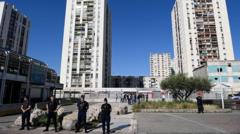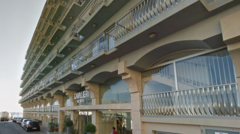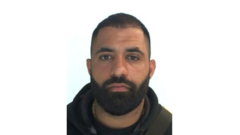Several French cities have enacted nighttime curfews for children and teenagers to combat escalating violence associated with drug trafficking, particularly in Nîmes, where recent incidents have raised alarms.
French Cities Implement Curfews for Minors Amid Drug-Related Violence

French Cities Implement Curfews for Minors Amid Drug-Related Violence
Authorities respond to escalating drug warfare and youth violence in Nîmes and other regions.
In an attempt to shield minors from the rising tide of violence linked to the drug trade, several French cities are enforcing night-time curfews. Nîmes has recently joined the ranks of cities like Béziers and Limoges, implementing these restrictions to ensure that individuals under the age of 16 are kept off the streets between 9 PM and 6 AM. This decision comes after a series of violent events, including shootings and a grisly discovery of a burned body, which prompted local officials to declare the situation "untenable."
Nîmes' Mayor, Jean-Paul Fournier, emphasized that the curfews would protect both minors not involved in drug activities and younger children who are often exploited by drug traffickers. Meanwhile, in Béziers, where a curfew for those under 13 has been in place since last year, Mayor Robert Ménard noted that such measures are essential but still witness significant violence, with reports of attacks on police during disturbances.
Limoges has faced similar challenges, with Mayor Émile Roger Lombertie admitting that despite curfews, disturbances continued without any effective police intervention. He called for a stronger policing presence to enforce these measures.
The escalation of violence reflects a larger trend throughout France, extending beyond the historic drug violence concentrated in Marseille. According to the interior ministry, over 110 individuals have lost their lives to drug-related violence in the current year alone. In response to the growing crisis, government officials, including Justice Minister Gérard Darmanin, have spearheaded legislative efforts aimed at combating drug trafficking, which includes establishing high-security prisons for serious offenders.
As these cities continue to grapple with the ramifications of drug-related crime, the effectiveness of curfews remains under scrutiny amid fears of a worsening public safety situation.
Nîmes' Mayor, Jean-Paul Fournier, emphasized that the curfews would protect both minors not involved in drug activities and younger children who are often exploited by drug traffickers. Meanwhile, in Béziers, where a curfew for those under 13 has been in place since last year, Mayor Robert Ménard noted that such measures are essential but still witness significant violence, with reports of attacks on police during disturbances.
Limoges has faced similar challenges, with Mayor Émile Roger Lombertie admitting that despite curfews, disturbances continued without any effective police intervention. He called for a stronger policing presence to enforce these measures.
The escalation of violence reflects a larger trend throughout France, extending beyond the historic drug violence concentrated in Marseille. According to the interior ministry, over 110 individuals have lost their lives to drug-related violence in the current year alone. In response to the growing crisis, government officials, including Justice Minister Gérard Darmanin, have spearheaded legislative efforts aimed at combating drug trafficking, which includes establishing high-security prisons for serious offenders.
As these cities continue to grapple with the ramifications of drug-related crime, the effectiveness of curfews remains under scrutiny amid fears of a worsening public safety situation.



















